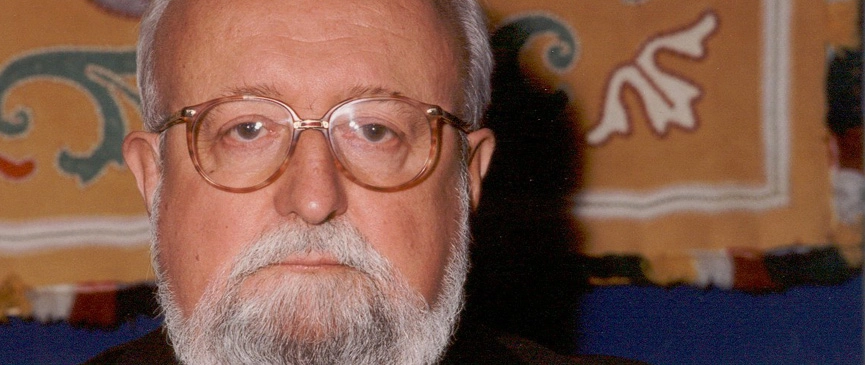Main content
Krzysztof Penderecki Prince of Asturias Award for the Arts 2001

Krzysztof Penderecki (Dębica, Poland, 1933 - Kraków, Poland, 2020) began his musical training studying composition under Franciszek Skolyszewski. He completed his studies in 1958 at the Krakow Music Academy (which today bears his name), but maintained links with this institution, first as lecturer and then as its director in 1972. Between 1966 and 1968, he also taught at the Folkwangschule für Musik, in Essen, Germany, as well as teaching at Yale University (USA) between 1972 and 1978. He debuted as a conductor in 1972 and has since conducted the world’s leading orchestras, including the London Symphony Orchestra and Munich Philharmonic in Europe, New York Philharmonic Orchestra and Philadelphia Philharmonic Orchestra in the USA, and the Japanese Radio Orchestra (NHK) in Tokyo and the Osaka Philharmonic Orchestra, both in Asia.
He made his international debut in 1959 at Warsaw’s Autumn Festival with his contemporary music composition Strophen, which was one of three works that earned him first prize at Poland’s National Competition for Young Composers. The other two works recognized with this award were Psalms of David and Emanations. In 1960, he composed one of his most widely recognized works, Threnody for the Victims of Hiroshima, and the following year gained the recognition of the International Rostrum of Composers, a prize he received at the UNESCO headquarters in Paris. Over the following years, he made enormously successful public presentations of several of his works, including his major work, The Passion according to St Luke, which was commissioned to celebrate the 700th anniversary of Münster Cathedral, in Germany, premiered in 1966, the year commemorating the Millennium of Christianity in Poland. His first opera, The Devils of Loudun (1969), was followed by oratorios such as the one he composed in 1970 for the celebrations of the 25th Anniversary of the creation of the UN, Cosmogony and Te Deum (1980), in honour of His Holiness Pope John Paul II. In 1982 –at the request of the Berlin Philharmonic Orchestra– he wrote Cello Concerto No. 2, premiered in 1983 by the Berlin Philharmonic Orchestra and dedicated to Maestro Mstislav Rostropovich and the musicians of said orchestra.
Another of his most emblematic works, The Seven Gates of Jerusalem (1996), was composed for the closure of the celebrations of the city’s three thousand years of history. In 2002, he premiered the piano concerto Resurrection in response to the terrorist attacks of September 11, 2001. In 2009, the composer travelled to Venezuela to work with the Simón Bolívar Orchestra and, on the occasion of José Antonio Abreu’s 70th birthday, he dedicated he composed the work O Gloriosa Virginum to the Venezuelan maestro. He also wrote music for films and short films, and his compositions have formed part of the soundtracks of films by Stanley Kubrick and Martin Scorsese. He published a book entitled “The Labyrinth of Time: Five Lectures for the End of the Century” (1997).
He received honorary doctorates from different universities, in addition to numerous distinctions, including 5 Grammy Awards, the Best Composer Award at MIDEM Classical Awards (Cannes, 2000) and the Praemium Imperiale for Music, awarded by the Japan Art Association (2004), among other distinctions.
End of main content
